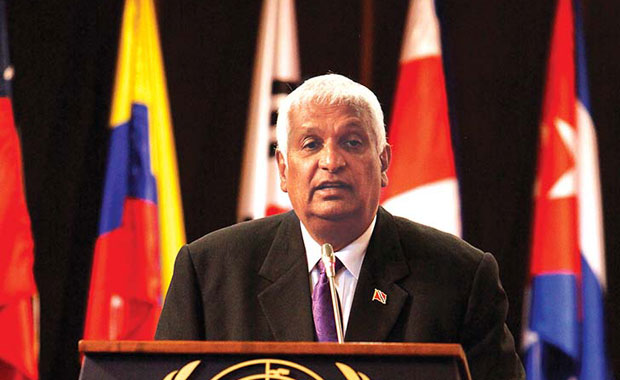“Contribution of Indian community in TnT significant”
Mr Winston Dookeran, Minister of Foreign Affairs, Trinidad and Tobago
Minister Winston Dookeran, Trinidad and Tobago’s Foreign Minister, has donned many hats. A profound intellectual, he has taught economics at the University of West Indies for 15 years, been a visiting scholar at the Centre for International Affairs at the Harvard University, functioned as Governor at Central Bank, been a trustee at The Foundation for Politics and Leadership. Back in the early 1990s when he was acting Prime Minister of his country he had to intelligently stave off a coup by a bunch of armed insurgents who held several leaders hostage inside Parliament. One of the insurgents holding a gun to his head inquired about his portfolio to which Mr Dookeran replied that he was the Minister of Planning. The masked insurgent replied, “I sure you did not plan for this one…” Mr Dookeran successfully took charge of negotiations and after six very difficult days managed to restore democracy back in his country. In 2006 he formed the Congress of The People, a political party that is part of the ruling coalition in Trinidad and Tobago. He responds to India Empire’s Editor Sayantan Chakravarty in what is our cover story this issue
Kindly comment on the measure of economic and social progress which the present Government of Prime Minister Kamla Persad-Bissessar has accomplished….
Prime Minister Kamla Persad-Bissessar was able to shift the priorities of her expenditure to provide a better deal for the disposes and the lower income groups in the society. She has also been able to give greater emphasis to the issues affecting children, mothers and health. One example of this can be seen through the Children’s Life Fund which was launched in August 2010 to provide funding and critical support specifically for children needing lifesaving, tertiary-level health care services in addition to other health services in the public health system that can now be accessed.These efforts were taken in order to improvehealth-care in Trinidad and Tobago.
How does this level of achievement exceed or miss the intended targets?
Her achievements in this regard, have exceeded the intended targets in areas such as improvement in water supply, nutrition and access to school at an earlier age.For example, this government embarked on the establishment of standards for Early Childhood Services that have been identified worldwide as a fundamental step towards a cohesive high quality national agenda for early childhood development, thus, a significant number of Early Childhood Centres were built in keeping with this mandate to provide free Early Childhood education to the nation’s children.
How much of that has been adapted to circumstances and conditions in Trinidad and Tobago, regionally and globally?
The programme and activity of the government was in response to the circumstances of Trinidad and Tobago where income disparity was growing. It was a challenge for her government to find its rightful place in the regional and global economy, partly as a result of the exposure of Trinidad and Tobago to the external oil market, but also being the leader in the Caribbean region which was under serious stress of a fiscal nature in the aftermath of the 2008/09 global recession.
Was the collaboration of your party Congress of the People (COP) and PM Kamla Persad Bissessar party (UNC), the kind of success you envisioned, exceeded or less than expected and reasons for that?
The collaboration between the COP and the UNC did not succeed as I had originally envisioned, as the politics of coalition was new to Trinidad and Tobago, the political systems was unable to accommodate the coalition demands.
Are you content with the decision making process and your role in the coalition?
One of the weaknesses of the coalition of parties was indeed the decision making process, but in the governance of the country, there was a satisfactory achievement in collective decision making process, in other words, while there were challenges in the politics, this did not necessarily reflect itself in the running of the country. My personal role in the coalition was relegated to the Ministries of Finance and Foreign Affairs. I was pleased to have embarked in major changes of those two (2) areas. However, my role in the politics of the coalition was somewhat diminished.










Comments.